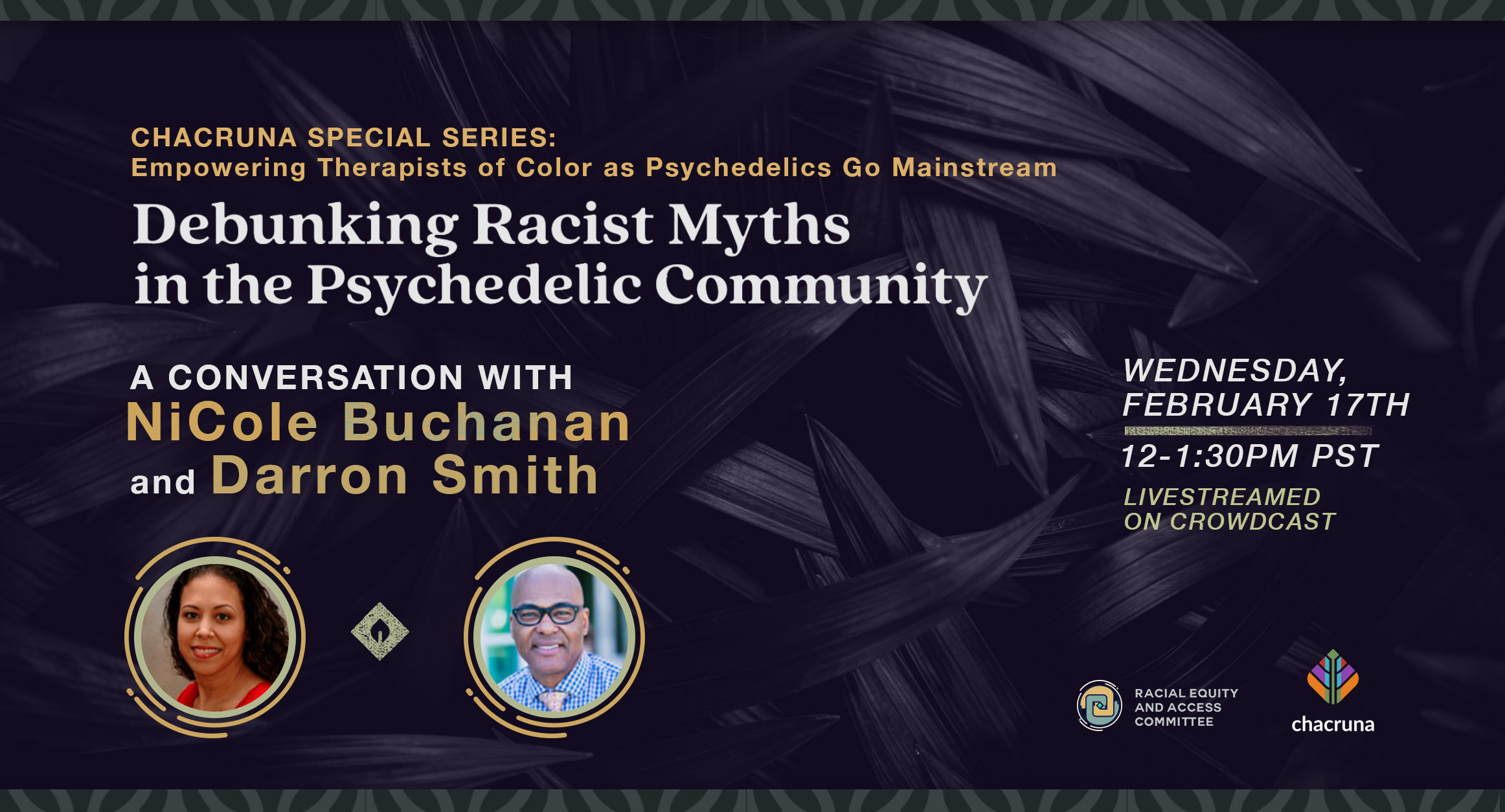- Meet Chacruna at Psychedelic Science 2025 - May 27, 2025
- Psychedelics and Attachment: Fundamentals, Implications, and New Frontiers - May 16, 2025
- Development Outreach Internship (OPEN) - May 6, 2025
Debunking Racist Myths in the Psychedelic Community
A Conversation with NiCole Buchanan and Darron Smith
Wednesday, February 17th from 12-1:30pm
Chacruna recently released an educational film that featured members of our Racial Equity and Access Committee responding to a selection of oversimplified and racist beliefs that have circulated around the psychedelic community. This film was created in response to the many hostile comments we saw being posted on the social media of various psychedelic organizations who had shared solidarity statements for the Black Lives Matter movement. We reviewed and categorized the common trends in these comments, and identified and attempted to debunk several common myths that perpetuate racist beliefs. These include the following:
- Psychedelics are not political
- Psychedelics cure racism
- Drug laws affect us all equally
- Anti-racism is not a necessary part of the psychedelic fight
Please note that the film will not be screened at the event so we recommend you watch it beforehand here: Chacruna Debunks 6 Racist Myths from the Psychedelic Community. At this event, join NiCole Buchanan and Darron Smith as we dig deeper into some of these myths, and explore how we can combat hatred, racism and bigotry in our own communities.

NiCole T. Buchanan, Ph.D., is a Professor of Psychology at Michigan State University and Clinical Director and Founder of Alliance Psychological Associates, PLLC in East Lansing, MI. She is a member of Chacruna’s Racial Equity and Access Committee and a trainee in the MAPS MDMA-assisted psychotherapy training for communities of color and anticipates offering MDMA-assisted psychotherapy when clinical trials are completed. Dr. Buchanan is a fellow of the Association for Psychological Science, four separate divisions of the American Psychological Association, and has received numerous national and international awards for her research, teaching, clinical work, and professional service. She is an accomplished speaker, writer, and scholar with more than 70 journal articles, book chapters, and research reports, and her work has been highlighted in hundreds of media outlets, including CBS News, the Huffington Post, and Essence Magazine, and she has been a featured speaker for several programs, including TEDx and National Public Radio (NPR).

Darron T. Smith is a NCCPA-certified physician assistant and faculty member in the Department of Sociology at the University of Memphis. His areas of research and scholarship examine US-based systems of racial oppression and systemic inequality found in all domains across society including healthcare, the family (transracial adoption), healthcare disparities, religion, sport, culture and politics. Dr. Smith’s current research and practice intertwine the study of neurosociology, race-based trauma and mental illness by looking at the impact of neurofeedback versus MDMA-assisted psychotherapy on brainwave activity in individuals with racial trauma (PTSD) using EEG technology. He is featured in the CBS Sports Documentary, “The Black 14: Wyoming Football 1969,” as well as the Loki Mulholland film on transracial adoption, “Black, White & Us: Love is Not Enough.” He is the author of When Race, Religion & Sports Collide: Black Athletes at BYU and Beyond. Dr. Smith is a member of Chacruna’s Racial Equity and Access Committee.
Do you love Chacruna? Want free entry to events, access to our online member community and exclusive events, free merchandise, and much more! Become a member! https://www.patreon.com/chacruna
Scholarships Available. Apply here: https://forms.gle/27Lz3jDWtyHgJCaz9
Take a minute to browse our stock:
Did you enjoy reading this article?
Please support Chacruna's work by donating to us. We are an independent organization and we offer free education and advocacy for psychedelic plant medicines. We are a team of dedicated volunteers!
Can you help Chacruna advance cultural understanding around these substances?














